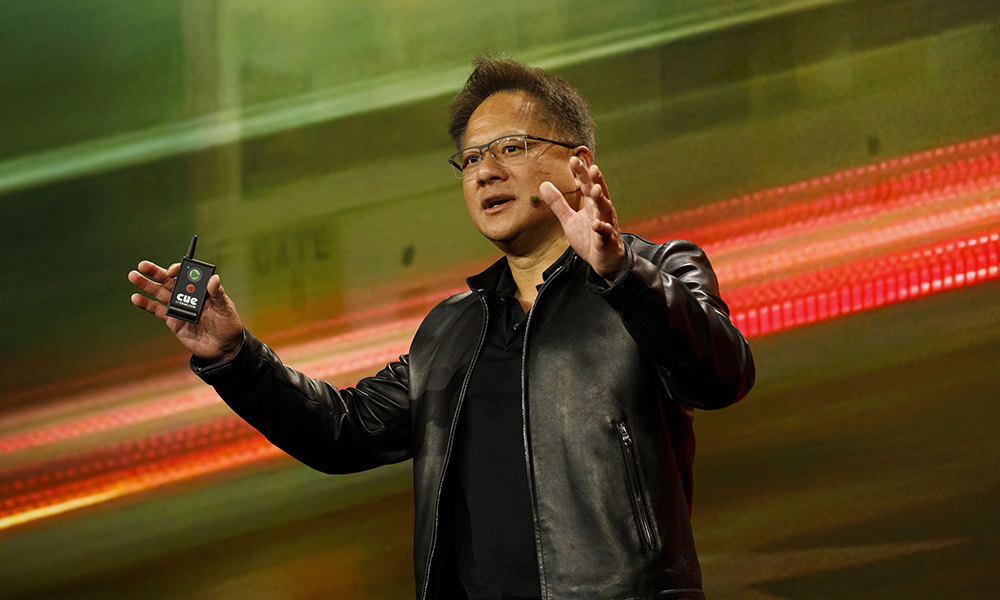
英偉達(dá)經(jīng)歷了相當(dāng)不尋常的一周,。
這家專門生產(chǎn)人工智能芯片的科技公司上周四一天市值增加了2770多億美元,,打破了此前由Meta保持的單日市值增長(zhǎng)紀(jì)錄。英偉達(dá)公布的最新財(cái)報(bào)超出分析師預(yù)期,,上季度營(yíng)收約為221億美元,。該公司目前是美國(guó)第三大最有價(jià)值的公司,僅次于蘋果(Apple)和微軟(Microsoft),。
英偉達(dá)創(chuàng)始人兼首席執(zhí)行官黃仁勛上周寫道:“加速計(jì)算和生成式人工智能已達(dá)臨界點(diǎn),。世界各地的公司、行業(yè)和國(guó)家的需求都在飆升,?!?/p>
但是,這家有望成為全球最重要公司的芯片制造商在創(chuàng)業(yè)期微不足道,,誕生于一家丹尼連鎖餐廳(Denny’s),,其成功之路也并非一帆風(fēng)順。以下是英偉達(dá)和黃仁勛給出的關(guān)于培養(yǎng)領(lǐng)導(dǎo)力的關(guān)鍵經(jīng)驗(yàn),。黃仁勛將恐懼視為一種動(dòng)力,,與高管通力合作,并提醒員工,,公司距離倒閉不超過一個(gè)月時(shí)間,。
堅(jiān)持己見
面對(duì)科技行業(yè)的不確定性,黃仁勛將賭注押在了一種特定的技術(shù)上,,即GPU,。
GPU是圖形處理器(Graphics Processing Unit)的縮寫,以前被認(rèn)為是一種小眾技術(shù),,主要供游戲玩家使用,。如今,,它對(duì)人工智能至關(guān)重要,一位分析師將人工智能的繁榮比作一場(chǎng)戰(zhàn)爭(zhēng),,并稱英偉達(dá)是“唯一的軍火商”,。
但是,黃仁勛在其他人還不清楚GPU會(huì)帶來(lái)回報(bào)的時(shí)候,,就已經(jīng)在GPU上下注了,,并且無(wú)論順境還是逆境都堅(jiān)持了這一決定。Deepwater Asset Management管理合伙人吉恩·蒙斯特(Gene Munster)告訴《財(cái)富》雜志:“黃仁勛所做的就是認(rèn)識(shí)到,,盡管GPU市場(chǎng)起起伏伏,,但最終只要有足夠多的用例,就會(huì)實(shí)現(xiàn)相互抵消,?!?/p>
蒙斯特補(bǔ)充說:“黃仁勛的與眾不同之處在于,他是一位戰(zhàn)時(shí)首席執(zhí)行官,?!奔词乖谟ミ_(dá)不被投資者看好、面臨短期挫折的情況下,,該公司仍“堅(jiān)持對(duì)未來(lái)走向的看法”,。
無(wú)知是福
黃仁勛曾公開表示,如果他知道創(chuàng)辦和維護(hù)一家公司有多艱難,,他可能就不會(huì)創(chuàng)辦英偉達(dá)了,。
去年,黃仁勛在Acquired播客節(jié)目中說:“創(chuàng)辦一家公司和創(chuàng)辦英偉達(dá)比我預(yù)想的要難一百萬(wàn)倍,,也比我們?nèi)魏稳祟A(yù)想的要難一百萬(wàn)倍,。”
他補(bǔ)充說,,無(wú)知不僅對(duì)他個(gè)人很重要,,對(duì)所有創(chuàng)始人來(lái)說都很重要。
他說:“我認(rèn)為這是創(chuàng)業(yè)者的一種超能力,。他們不知道創(chuàng)業(yè)有多難,。他們只會(huì)問自己:'這能有多難?’直到今天,我還讓自己的大腦誤認(rèn)為:'這能有多難,?’”
恐懼是強(qiáng)大動(dòng)力
英偉達(dá)在早期曾遭遇嚴(yán)重挫折,。
在2002年互聯(lián)網(wǎng)泡沫破裂和2008年金融危機(jī)期間,這家初創(chuàng)公司舉步維艱,,當(dāng)時(shí)對(duì)其產(chǎn)品的需求急劇下降,。
在諸事不順時(shí),公司毫不避諱地向員工表明,公司離破產(chǎn)有多近,。事實(shí)上,,英偉達(dá)早年的口頭禪是:“我們公司再有30天就要倒閉了?!啊?/p>
去年11月,黃仁勛在《哈佛商業(yè)評(píng)論》的“未來(lái)商業(yè)”線上會(huì)議表示:“我們的優(yōu)勢(shì)在于白手起家,,毫不夸張地說經(jīng)歷了數(shù)次幾近倒閉的事件,。我們不必假裝公司總是處于危險(xiǎn)之中,而是真切感覺到,,公司總是處于危險(xiǎn)之中,。”
黃仁勛認(rèn)為,,領(lǐng)導(dǎo)者必須時(shí)刻牢記自己離失敗有多近,。去年秋天,他在哥倫比亞商學(xué)院的“數(shù)字未來(lái)倡議”中表示:“你總是在破產(chǎn)的路上,。如果不將這種敏銳內(nèi)化于心,,你就會(huì)被淘汰出局?!?/p>
合作是關(guān)鍵
如果不與高管合作,,黃仁勛就不可能建立起自己的人工智能和芯片帝國(guó)。
在建立公司治理體系時(shí),,英偉達(dá)決定將決策權(quán)分配給黃仁勛和其他創(chuàng)始人克里斯·馬拉喬斯基(Chris Malachowsky)和柯蒂斯·普里姆(Curtis Priem),。盡管馬拉喬斯基和普里姆在黃仁勛的指導(dǎo)下工作,但他們?cè)诠緝?nèi)部掌權(quán),,并領(lǐng)導(dǎo)自己的部門,。
普里姆去年12月告訴《華爾街日?qǐng)?bào)》:"我們會(huì)就彼此的決定進(jìn)行討論或爭(zhēng)論,但會(huì)默認(rèn)由在該領(lǐng)域擁有專業(yè)知識(shí)的人做出最終決定,。這不是'求同存異',。這一決定終結(jié)了所有分歧,指出了前進(jìn)方向,?!?/p>
分享失敗經(jīng)歷
黃仁勛認(rèn)為"必須分享失敗經(jīng)歷",而且他從不回避承擔(dān)責(zé)任,,勇于指出導(dǎo)致全公司出現(xiàn)更大問題的錯(cuò)誤,。
早在21世紀(jì)初,英偉達(dá)就曾因顯卡風(fēng)扇聲音過大而陷入困境,。黃仁勛并沒有解雇產(chǎn)品經(jīng)理,,而是召開了一個(gè)會(huì)議,讓相關(guān)人員回顧導(dǎo)致出現(xiàn)不良品的錯(cuò)誤環(huán)節(jié)。
展示自己的失敗經(jīng)歷已經(jīng)成為英偉達(dá)的一種既定文化模式,,但這并不適合所有人,。
去年11月,英偉達(dá)軟件部門主管德懷特·迪克斯(Dwight Diercks)在接受《紐約客》采訪時(shí)表示:“你一眼就能看出誰(shuí)能在這里堅(jiān)持下去,,誰(shuí)不能,。如果有人開始采取防御措施,我就知道他們無(wú)法堅(jiān)持下來(lái),?!保ㄘ?cái)富中文網(wǎng))
譯者:中慧言-王芳
英偉達(dá)經(jīng)歷了相當(dāng)不尋常的一周。
這家專門生產(chǎn)人工智能芯片的科技公司上周四一天市值增加了2770多億美元,,打破了此前由Meta保持的單日市值增長(zhǎng)紀(jì)錄,。英偉達(dá)公布的最新財(cái)報(bào)超出分析師預(yù)期,上季度營(yíng)收約為221億美元,。該公司目前是美國(guó)第三大最有價(jià)值的公司,,僅次于蘋果(Apple)和微軟(Microsoft)。
英偉達(dá)創(chuàng)始人兼首席執(zhí)行官黃仁勛上周寫道:“加速計(jì)算和生成式人工智能已達(dá)臨界點(diǎn),。世界各地的公司,、行業(yè)和國(guó)家的需求都在飆升?!?/p>
但是,,這家有望成為全球最重要公司的芯片制造商在創(chuàng)業(yè)期微不足道,誕生于一家丹尼連鎖餐廳(Denny’s),,其成功之路也并非一帆風(fēng)順,。以下是英偉達(dá)和黃仁勛給出的關(guān)于培養(yǎng)領(lǐng)導(dǎo)力的關(guān)鍵經(jīng)驗(yàn)。黃仁勛將恐懼視為一種動(dòng)力,,與高管通力合作,,并提醒員工,公司距離倒閉不超過一個(gè)月時(shí)間,。
堅(jiān)持己見
面對(duì)科技行業(yè)的不確定性,,黃仁勛將賭注押在了一種特定的技術(shù)上,即GPU,。
GPU是圖形處理器(Graphics Processing Unit)的縮寫,,以前被認(rèn)為是一種小眾技術(shù),主要供游戲玩家使用,。如今,,它對(duì)人工智能至關(guān)重要,一位分析師將人工智能的繁榮比作一場(chǎng)戰(zhàn)爭(zhēng),,并稱英偉達(dá)是“唯一的軍火商”,。
但是,,黃仁勛在其他人還不清楚GPU會(huì)帶來(lái)回報(bào)的時(shí)候,就已經(jīng)在GPU上下注了,,并且無(wú)論順境還是逆境都堅(jiān)持了這一決定,。Deepwater Asset Management管理合伙人吉恩·蒙斯特(Gene Munster)告訴《財(cái)富》雜志:“黃仁勛所做的就是認(rèn)識(shí)到,盡管GPU市場(chǎng)起起伏伏,,但最終只要有足夠多的用例,,就會(huì)實(shí)現(xiàn)相互抵消?!?/p>
蒙斯特補(bǔ)充說:“黃仁勛的與眾不同之處在于,,他是一位戰(zhàn)時(shí)首席執(zhí)行官?!奔词乖谟ミ_(dá)不被投資者看好、面臨短期挫折的情況下,,該公司仍“堅(jiān)持對(duì)未來(lái)走向的看法”,。
無(wú)知是福
黃仁勛曾公開表示,如果他知道創(chuàng)辦和維護(hù)一家公司有多艱難,,他可能就不會(huì)創(chuàng)辦英偉達(dá)了,。
去年,黃仁勛在Acquired播客節(jié)目中說:“創(chuàng)辦一家公司和創(chuàng)辦英偉達(dá)比我預(yù)想的要難一百萬(wàn)倍,,也比我們?nèi)魏稳祟A(yù)想的要難一百萬(wàn)倍,。”
他補(bǔ)充說,,無(wú)知不僅對(duì)他個(gè)人很重要,,對(duì)所有創(chuàng)始人來(lái)說都很重要。
他說:“我認(rèn)為這是創(chuàng)業(yè)者的一種超能力,。他們不知道創(chuàng)業(yè)有多難,。他們只會(huì)問自己:'這能有多難?’直到今天,我還讓自己的大腦誤認(rèn)為:'這能有多難,?’”
恐懼是強(qiáng)大動(dòng)力
英偉達(dá)在早期曾遭遇嚴(yán)重挫折,。
在2002年互聯(lián)網(wǎng)泡沫破裂和2008年金融危機(jī)期間,這家初創(chuàng)公司舉步維艱,,當(dāng)時(shí)對(duì)其產(chǎn)品的需求急劇下降,。
在諸事不順時(shí),公司毫不避諱地向員工表明,,公司離破產(chǎn)有多近,。事實(shí)上,英偉達(dá)早年的口頭禪是:“我們公司再有30天就要倒閉了,?!啊?/p>
去年11月,,黃仁勛在《哈佛商業(yè)評(píng)論》的“未來(lái)商業(yè)”線上會(huì)議表示:“我們的優(yōu)勢(shì)在于白手起家,毫不夸張地說經(jīng)歷了數(shù)次幾近倒閉的事件,。我們不必假裝公司總是處于危險(xiǎn)之中,,而是真切感覺到,公司總是處于危險(xiǎn)之中,?!?/p>
黃仁勛認(rèn)為,領(lǐng)導(dǎo)者必須時(shí)刻牢記自己離失敗有多近,。去年秋天,,他在哥倫比亞商學(xué)院的“數(shù)字未來(lái)倡議”中表示:“你總是在破產(chǎn)的路上。如果不將這種敏銳內(nèi)化于心,,你就會(huì)被淘汰出局,。”
合作是關(guān)鍵
如果不與高管合作,,黃仁勛就不可能建立起自己的人工智能和芯片帝國(guó),。
在建立公司治理體系時(shí),英偉達(dá)決定將決策權(quán)分配給黃仁勛和其他創(chuàng)始人克里斯·馬拉喬斯基(Chris Malachowsky)和柯蒂斯·普里姆(Curtis Priem),。盡管馬拉喬斯基和普里姆在黃仁勛的指導(dǎo)下工作,,但他們?cè)诠緝?nèi)部掌權(quán),并領(lǐng)導(dǎo)自己的部門,。
普里姆去年12月告訴《華爾街日?qǐng)?bào)》:"我們會(huì)就彼此的決定進(jìn)行討論或爭(zhēng)論,,但會(huì)默認(rèn)由在該領(lǐng)域擁有專業(yè)知識(shí)的人做出最終決定。這不是'求同存異',。這一決定終結(jié)了所有分歧,,指出了前進(jìn)方向?!?/p>
分享失敗經(jīng)歷
黃仁勛認(rèn)為"必須分享失敗經(jīng)歷",,而且他從不回避承擔(dān)責(zé)任,勇于指出導(dǎo)致全公司出現(xiàn)更大問題的錯(cuò)誤,。
早在21世紀(jì)初,,英偉達(dá)就曾因顯卡風(fēng)扇聲音過大而陷入困境。黃仁勛并沒有解雇產(chǎn)品經(jīng)理,,而是召開了一個(gè)會(huì)議,,讓相關(guān)人員回顧導(dǎo)致出現(xiàn)不良品的錯(cuò)誤環(huán)節(jié)。
展示自己的失敗經(jīng)歷已經(jīng)成為英偉達(dá)的一種既定文化模式,,但這并不適合所有人,。
去年11月,英偉達(dá)軟件部門主管德懷特·迪克斯(Dwight Diercks)在接受《紐約客》采訪時(shí)表示:“你一眼就能看出誰(shuí)能在這里堅(jiān)持下去,,誰(shuí)不能,。如果有人開始采取防御措施,,我就知道他們無(wú)法堅(jiān)持下來(lái)?!保ㄘ?cái)富中文網(wǎng))
譯者:中慧言-王芳
Nvidia is having quite a week.
The tech company, which specializes in making chips used for AI, added more than $277 billion in market value on Thursday, beating the record for single-day market gains previously held by Meta. The surge followed company earnings on Wednesday, in which Nvidia beat analyst expectations and reported revenues of around $22.1 billion last quarter. It is now the third most valuable company in the U.S., behind Apple and Microsoft.
“Accelerated computing and generative AI have hit the tipping point,” Nvidia founder and CEO Jensen Huang wrote this week. “Demand is surging worldwide across companies, industries, and nations.”
But the chipmaker poised to become the most important company in the world has humble beginnings—it was born in a Denny’s restaurant—and its path to success has not been linear. Here are some key leadership lessons from Nvidia and Huang, who embraces fear as a motivator, collaborates with his top managers, and reminds his workers that the company is never more than a month away from shutting down.
Stick to your guns
In navigating the uncertainty of the tech industry, Huang bet on a specific kind of technology—GPUs.
That stands for graphics processing unit, which was previously considered a niche technology and mostly used by gamers. Now, it’s critical to AI, with one analyst likening the AI boom to a war, and calling Nvidia the “only arms dealer out there.”
But Huang bet on GPUs years before it was clear to everyone else that it would pay off, and stuck to that decision through bad times and good. “What he did was recognize that even though there was boom and bust around the GPU, that eventually if there were enough use cases of it, they would offset each other,” Gene Munster, managing partner at Deepwater Asset Management, told Fortune.
“What sets Jensen apart is he’s a wartime CEO,” Munster added. Even when Nvidia is out of favor with investor consensus, and facing near-term setbacks, the company stays “true to [its] view of the future.”
Ignorance is bliss
Huang has openly said that if he knew how hard it would be to create and maintain his company, he probably wouldn’t do it again.
“Building a company and building Nvidia turned out to have been a million times harder than I expected it to be, than any of us expected it to be,” Huang said last year on the Acquired podcast.
He added that ignorance wasn’t just important for him personally—it’s an important quality for all founders.
“I think that’s kind of the superpower of an entrepreneur. They don’t know how hard it is. And they only ask themselves: ‘How hard can it be?’ To this day, I trick my brain into thinking: ‘How hard can it be?’” he said.
Fear is a powerful motivator
Nvidia had some serious setbacks in its early days.
The startup struggled during the dotcom crash in 2002 and the financial crisis in 2008, when demand for its products plummeted.
When everything was going wrong, the company wasn’t shy about making clear to employees how close they were to the brink. In fact, a mantra for Nvidia in its early years was: “Our company is 30 days from going out of business.”
“We have the benefit of building the company from the ground up and having not exaggerated circumstances of nearly going out of business a handful of times,” Huang said last November at Harvard Business Review’s virtual Future of Business conference. “We don’t have to pretend the company is always in peril. The company is always in peril, and we feel it.”
Huang believes it’s critical for leaders to always remember how close they are to failure. “You’re always on the way to going out of business,” he said at Columbia Business School’s Digital Future Initiative last fall. “If you don’t internalize that sensibility, you will go out of business.”
Collaboration is key
Huang couldn’t have amassed his AI and chip empire without collaborating with his top lieutenants.
In forming a system of governance, Nvidia decided to split decision-making among Huang and his fellow founders, Chris Malachowsky and Curtis Priem. Even though Malachowksy and Priem worked under Huang’s command, they each had authority and led their own divisions within the company.
“We would talk or argue over each other’s decisions, but we would default to the final decision of the person who had the expertise in that area,” Priem told the Wall Street Journal in December last year. “It wasn’t ‘a(chǎn)gree to disagree.’ The decision terminated any disagreements and became the direction we were going.”
Share your failures
Huang believes that “failure must be shared,” and doesn’t shy away from taking ownership and pointing out errors that led to larger companywide problems.
Back in the early 2000s, Nvidia ran into some trouble with a faulty graphic card that had a loud fan. Instead of firing the product managers, Huang held a meeting where the people involved walked through the mistakes that led to creating a bad product.
Exhibiting one’s failures has become a cultural fixture at Nvidia, but it’s not for everyone.
“You can kind of see right away who is going to last here and who is not,” Dwight Diercks, head of software for Nvidia, told The New Yorker last November. “If someone starts getting defensive, I know they’re not going to make it.”






